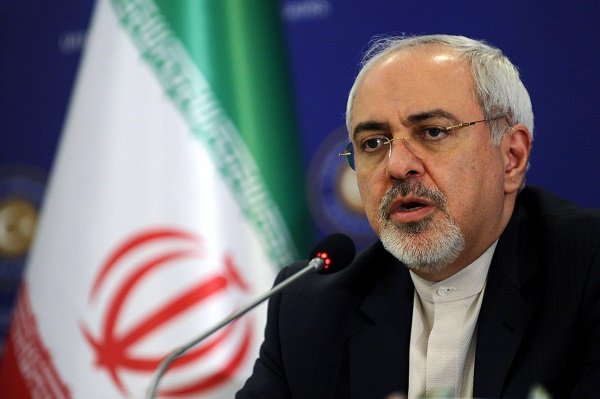Mohammad Javad Zarif delivered a lengthy address to the meeting of Army Command and General Staff College (Persian acronym: DAFOOS) on Monday where he covered a vast area of subject matters with relevance to international conditions and the meaning of power.
Mr. Zarif quoted the Leader of the Islamic Republic in his oft-cited phrase ‘a dangerous turn in international politics’ to define current conditions of global politics, expressly confirming the phrase relevant to the literature of the international relations and in defining a period of transition and temporality.
Zarif then commented on the transient nature of the conditions; “in a transition period, it is no longer possible for countries to predict and behave accordingly the moves of other players; the ancien régime had fallen apart and no new system has yet replaced the pandemonium ensued thus; countries find it difficult to shape their behavior in a framework informed by predictions of play of other players,” Zarif said. “The transition is generally the most critical time in the fate of the countries, and here the Leader’s phrase finds relevancy; many countries have ceased to exist in such ‘dangerous turn;’ countries with more pronounced role, survive and continue their in transition and volatile conditions,” he asserted.
“The reason why a country disintegrates into chaos or simply ceases to exist or a country of modest means in international relations goes up in the ladder of power is the cunning nature of the play; any country with well-calculated behavior will survive as a major power; on the contrary, countries with hamartia with strategic error of judgement will find only a debacle in the turn of the events; the most telling example is former Yugoslavia whose original lands have been divided by several countries with ethnic groups which quarreled in the former architecture,” Zarif told the meeting. “An accurate assessment and understanding of critical conditions gives countries roles otherwise not bestowed upon them in a more stable terrain; in a bipolar order, you should have defined yourself as taking sides with one of the poles, which would have set the scope of your play in any confrontation,” he added.
“For example, any country like the Islamic Republic of Iran acting independently from these two poles would be subject to animosity by both hegemonies; Iran-Iraq war was the first ever case that all five permanent members of the UN Security Council were in general consensus, with the second such rare consensus being in adoption of Resolution 598 and Iran’s nuclear program; in no other situations would we find such level of coordination. In some other cases, only three members had accord over a certain issue, but two others disagreed,” Zarif emphasized.
“They sat together to draft Resolution 598 of the UN Security Council when the war was in its zenith; however, an important change had been happening since then; the major interactors are no longer merely states; once upon a time, states had the monopoly in international relations; now, the situations have changed for good; every human being is an interactor in the system. In upper level, we have non-state actors such as Mafia, Al-Qaeda, international criminal gangs; other groups with human ideals do also exist such as Hezbollah of Lebanon that fights for a genuine cause and are non-state still,” Zarif told the meeting.
“Non-state actors had once been playing desecuritization role; now they do securitization, which had been traditionally a monopoly of states; now, any non-state actor could securitize by improving its place and influence. The new conditions entail ruling over hearts and minds,” he asserted. “I would ask why Benjamin Netanyahu is disturbed. The question is rather rhetoric, since he had succeeded in securitizing a regional power which inspired the resistance in the region to pose a real threat to Zionism; it is possible that you are a real security threat; in other odds, you are being securitized as a real threat; an international relations theory states that any player would succeed in depicting its specific enemy the enemy of the whole international community, building consensus against this newly-perceived threat to the global order,” he detailed.
“For example, Iran’s nuclear program is a clear example of the theory; a well-orchestrated attempt to depict Iran as seeking nukes mounted huge pressure on us, which could justify every crime against our nation and would only stir silence of the world; since Iran was perceived as threat to the world which should be contained,” Zarif provided examples. “Similarly, once upon a time any crime would have been justified against Shia Muslims, since Iran was related to these communities and was also a threat; today however, it is no longer tenable,” said the foreign minister.
Zarif quoted famous US politician and statesman Henry Kissinger who once had said that Iran should choose from two possible options: being an idealist or a real country; “they posed this question to me also, to whom I responded that whenever the US chooses between the two, we will follow the suit; they argued that the US was exceptional country. I made the same claim for Iran; there is no reason why we should abandon our instruments of power and leave them to others,” he accounted his arguments “since this idealism is an instrument of our national power and we should not give up this.”
“Our beliefs consolidate further our position, giving the strength to stand against the world and tell them that the heavenly promise would be realized; this helps us to move forward with confidence; through using this confidence, we will succeed in passing through the ‘dangerous turn,’ untrammeled and even more powerful,” Zarif concluded his address with hopes of the better future.
SH/2944934

























Your Comment